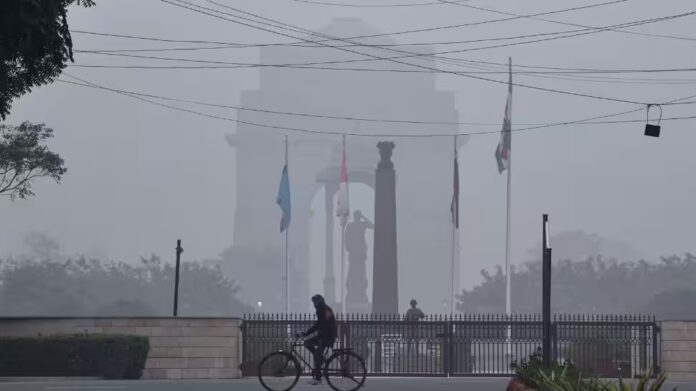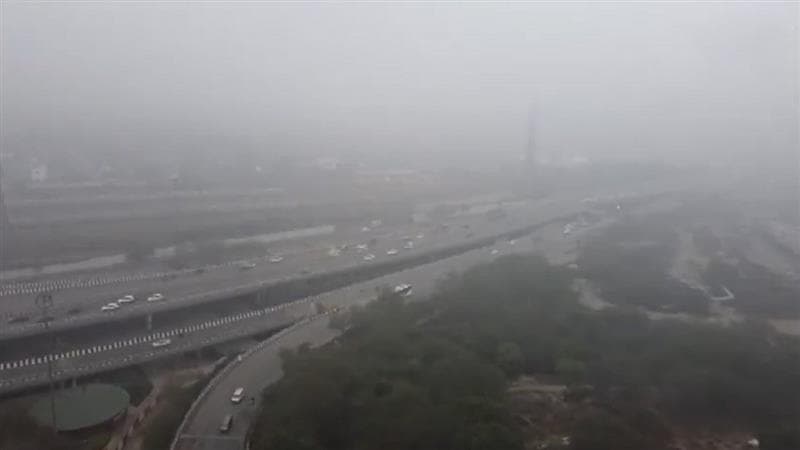Dense fog in Delhi-NCR has brought life to a standstill, with the India Meteorological Department (IMD) issuing an ‘orange’ alert on Monday. The thick fog has drastically reduced visibility, affecting key travel routes, including highways, railways, and flights at Indira Gandhi International Airport.
The IMD alert warns of continued dense to very dense fog over the next two days, with disruptions expected across major transport systems. Residents have been urged to exercise caution while traveling and stay updated on advisories from airlines, railways, and transport authorities.
Travel Disruptions Across Delhi-NCR
The dense fog has caused significant delays and disruptions:
- Flight Operations: Visibility at Indira Gandhi International Airport dropped to 50 meters, leading to the activation of low-visibility procedures. Although no major disruptions to flight operations have been reported, passengers have been advised to stay in contact with airlines for updates.
- Train Services: On Saturday, 45 trains were delayed due to foggy conditions, creating inconvenience for thousands of passengers. Rail services continue to face delays as visibility remains critically low.
- Road Travel: Highways and local roads are experiencing slower traffic due to difficult driving conditions. Fog-related accidents have been reported, emphasizing the need for caution while traveling.
The IMD has provided safety recommendations for commuters:
- Use fog lights and drive slowly to ensure safety.
- Maintain a safe distance between vehicles to avoid collisions.
- Plan travel with extra time to accommodate delays.
Temperature And Visibility Levels
The minimum temperature in Delhi on Monday is expected to be 7°C, with a maximum of 19°C. The IMD has forecast a further dip in temperatures over the week, with the minimum dropping to 6°C.
Visibility levels have been significantly impacted, with the IMD predicting very dense fog for Tuesday and Wednesday. This follows a record event earlier this month when visibility in Delhi dropped to zero between January 2 and 3 for nine consecutive hours—the longest stretch recorded this season.
Impact On Air Quality
While dense fog dominates, Delhi’s air quality has shown slight improvement. On Sunday evening, the Commission for Air Quality Management revoked Stage III anti-pollution curbs under the Graded Response Action Plan (GRAP) due to better air quality.
According to the Central Pollution Control Board, the Air Quality Index (AQI) stood at 278 (“poor”) on Sunday, improving from 327 (“very poor”) recorded the previous day. However, residents are advised to take precautions as poor air quality can still pose health risks, especially for vulnerable groups such as children and the elderly.
Recent Disruptions Caused By Dense Fog
The past week has seen major disruptions across various sectors due to dense fog:
- On Saturday, 209 flights, including arrivals and departures, were delayed, and five flights were canceled due to low visibility.
- Train schedules were severely affected, with 45 trains reported delayed on the same day.
- Road travel has been hazardous, with reduced visibility leading to traffic congestion and minor accidents.
These conditions have caused widespread inconvenience for commuters and disrupted the daily routines of residents across Delhi-NCR.

IMD’s Orange Alert And Safety Advisory
The IMD’s ‘orange’ alert highlights the severity of the situation and the potential for continued disruptions. The advisory emphasizes careful planning for travel and safety precautions:
- Stay updated on weather and travel advisories.
- Avoid non-essential travel during early mornings and late evenings when visibility is at its lowest.
- Ensure proper ventilation indoors to mitigate respiratory discomfort caused by the fog.
The IMD has also suggested wearing masks or scarves to reduce exposure to pollutants that may be trapped in the dense fog.
Community Response And Preparedness
Commuters and residents across Delhi-NCR are adapting to the challenges posed by the dense fog. Many have resorted to remote work arrangements to avoid travel disruptions, while others have adjusted their schedules to accommodate slower commuting times.
Emergency services and local authorities are working to manage the situation, ensuring that roads and public transport systems remain functional despite the adverse conditions. Traffic police have been deployed in key areas to manage congestion and assist drivers.
Outlook For The Week Ahead
The IMD forecasts continued foggy conditions over the next two days, with visibility likely to remain low. Minimum temperatures are expected to hover around 6°C, while the maximum may not exceed 19°C.
As dense fog persists, experts recommend caution and preparedness to navigate the challenges. By staying informed and taking appropriate measures, residents can ensure safety during this period of disrupted travel and reduced visibility.
The dense fog Delhi-NCR situation underlines the pressing need for vigilance and caution amid ongoing disruptions. With IMD’s orange alert in effect, the region braces for continued challenges as foggy conditions persist.


